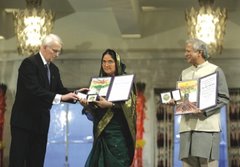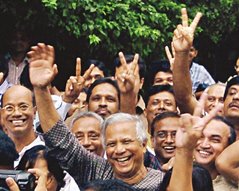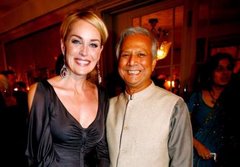DHAKA, Bangladesh (CNN) - Muhammad Yunus is the founder of Bangladesh's Grameen Bank. His idea was to lend to people that other banks ignored.
While others talk of lofty ways to crush poverty, Yunus is credited with down-to-earth solutions to make people self-sufficient.
His bank and other funds based on his model, give tiny loans to those at the very bottom of the economic ladder.
Grameen literally means rural in Bengali and it was in a small village in 1976 that Yunus first realised that a small loan could make a big difference.
"One thing that led me to what I do now was a woman making bamboo stool. She told me she made two pennies a day. I couldn't believe why she made two pennies a day. She made beautiful bamboo stools," Yunus told CNN.
The woman told him that the rest of her profit went to the local moneylender who bought the bamboo stool from her at a fixed price.
Yunus went around the village and found 42 people in need of just $27. At that moment, micro credit was born in one of the world's poorest countries.
Growing success
Grameen now has more than 1,000 branches that reach into 40,000 Bangladeshi villages. In 25 years it has lent more than $3 billion to two million borrowers.
In the village of Taltoli, an hour north of the capital, Dhaka, women go to the local branch to make their weekly payments. Some of them take their pension books too as they now earn enough to put a little bit aside every week for old age.
About 80 percent of the 1,000 people living in the village have a loan from Grameen Bank. In the 13 years that Grameen has lent money to them, not one villager has missed a monthly payment.
Yunus says there are two reasons: people invest wisely and apply peer pressure to make sure the village keeps a spotless record.
The region is known for making puff rice, but with Grameen loans some of the villagers now own chickens, trucks and even mobile phones.
One of Taltoli's successes is 39-year-old Diapli Rani. She had very little 12 years ago when she applied for her first loan of about $80. Now she has a poultry farm and her children are in school.
Rani also sits on the Grameen board and has something in common with 95 per cent of its borrowers -- they are all women.
Yunus originally aimed to lend 50-50 to men and women alike, but he says men did not spend the money to help their families. It is the children he is most proud of -- the first generation to grow up with the benefits of micro credit.
"Today I can safely say 100% of the children of Grameen Bank are in school," said Yunus.
Such success has attracted worldwide attention. As First Lady, Hillary Clinton visited a Grameen village with Yunus. While he was governor of Arkansas, Bill Clinton started one of the first micro credit groups outside Bangladesh.
The former president told Rolling Stone magazine that Yunus should receive a Nobel prize.
Yunus has also caught the eye of Mexico's President Vicente Fox who supports his controversial position that a micro credit loan, which can come with higher than average interest, is better than a handout.
"It dignifies because it promotes people's responsibility and people's will to work and to improve their own condition," said the president.
Providing inspiration
Laverne Jackson, 56, from Dallas in the U.S. also agrees.
She got a $500 loan from the local Grameen-inspired local "Plan Fund" to move her fledgling flower business into a small Dallas shop.
"I thought it was fantastic because you can't get another loan or any loan anywhere else without people wanting to know your credit history, how long...just everything about you," she told CNN.
The Dallas fund put Jackson and three other entrepreneurs into a group to ensure that each one paid off their loan and the interest.
The Grameen Bank and its offshoots say peer pressure makes it more likely people will repay loans. Laverne Jackson has not missed a payment.
Critics of Grameen say a loan with 20 per cent interest is too much of a hardship. The Bangladeshi government agrees.
Shah Kibria, Bangladeshi Finance Minister said: "Generally I think Dr. Muhummad Yunus has done a fine job. He is a very dynamic person and his methods have been used by others fruitfully, but the interest rate is too high, that is a major criticism."
However, Yunus defends the bank by saying "Today, the market rate is 15%. We charge 20% and deliver the service to the doorstep. None of our borrowers have to come to our office. Our staff go and provide the service at the door step."
Author David Bornstein spent months studying the Grameen Bank for his book "The Price of a Dream: The Story of the Grameen Bank".
He says that 20 percent in micro credit terms is actually quite low.
"There are micro credit organisations in Bolivia and in other parts of the world that charge 50 percent interest rates. I interviewed a lot of villagers for my book and none of them complained about the interest rate. That wasn't really a consideration," he told CNN.
When Yunus began, banks said the default rate would be too high, but 90 to 100 per cent of Grameen borrowers repay their loans. The success rate is the same as for a typical western commercial bank.
"So the fact that the bank manager was telling me that poor people are not credit worthy now has clearly demonstrated that they are very much credit worthy. The real question to be asked is whether the banks are people worthy," said Yunus.
Grameen earned $47 million in 1998. $2 million was profit. In most years the bank adds just over one per cent to Bangladeshi gross domestic product.
Yunus knows Grameen's income may be peanuts, but to other commercial banks, but he says it proves Grameen does not equal charity.
"Today the Grameen Bank is known as bank of the poor. This is how Grameen Bank is described and our success will be when we are described and accepted as the bank of the former poor."
Wednesday, January 31, 2007
Subscribe to:
Post Comments (Atom)






No comments:
Post a Comment